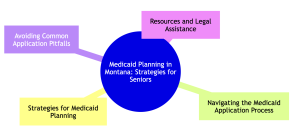Medicaid planning is crucial for Montana seniors facing the complexities of long-term care costs. This guide shines a light on navigating Medicaid’s eligibility criteria, offering strategies for planning and application. It’s tailored to help Montana families understand the ins and outs of securing Medicaid benefits, ensuring seniors can access the care they need without financial strain.
Keep scrolling for helpful, informative tables.
Key Takeaways
- Montana’s Medicaid eligibility hinges on specific income and asset criteria for seniors.
- Effective strategies exist to align with Medicaid’s asset and income limits.
- The look-back period plays a crucial role in asset transfer strategies.
- Medicaid waivers in Montana offer paths to home and community-based services.
- Expert legal assistance can streamline the Medicaid planning process.

Understanding Medicaid Eligibility in Montana
Montana’s Medicaid program sets clear eligibility criteria for seniors, focusing on income, assets, and medical needs. For single seniors, income and asset limits determine eligibility, while married couples face different considerations, especially when only one spouse requires care. Beyond financial criteria, applicants must demonstrate a medical need for long-term care, whether in a nursing facility or through home-based services.
Medicaid Planning: Asset and Income Limits
Fully understanding Medicaid’s financial criteria requires a deep dive into asset and income limits. These thresholds are pivotal in determining eligibility for Montana’s seniors.
Asset and Income Limits for Medicaid Eligibility
| Status | Income Limit | Asset Limit | Exempt Assets | Community Spouse Resource Allowance (CSRA) |
| Single Applicant | $2,382/month (for nursing home care) | $2,000 | Primary residence (up to equity limit), one vehicle, personal belongings, burial funds up to a certain limit. | N/A |
| Married (both applying) | $4,764/month (combined for nursing home care) | $3,000 (combined) | Same as single applicant, applied jointly. | N/A |
| Married (one applying) | $2,382/month (for applicant) | $2,000 for applicant, $137,400 for non-applicant spouse (2023 limit) | Same as single applicant for both spouses. | Up to $137,400 (2023 limit) for non-applicant spouse, not counting the applicant’s $2,000 limit. |
Strategies for Medicaid Planning
Medicaid planning is essential for Montana seniors looking to navigate the complexities of eligibility and asset management. Understanding the strategies available can make a significant difference in successfully securing Medicaid benefits.
Asset Reallocation and Spend-Down
Asset reallocation and spend-down methods allow seniors to adjust their financial standing to meet Medicaid’s eligibility criteria. Reaching the asset limit might involve spending excess assets on non-countable items like home improvements or prepaying funeral expenses.
Medicaid Trusts
Setting up Medicaid trusts can be a strategic move to protect your assets while maintaining eligibility for Medicaid. These trusts, specifically designed to comply with Medicaid rules, must be irrevocable to not count as an available asset.
Gifting and the Look-Back Period
The look-back period is a critical aspect of Medicaid planning. Any asset transferred for less than fair market value within five years before applying for Medicaid can result in a penalty period. Planning gifts carefully – with an understanding of the look-back period – is crucial to avoid penalties.
The Medicaid Application Process
Applying for Medicaid in Montana requires careful preparation and attention to detail. The process involves several steps, from gathering the necessary documentation to submitting your application to the state Medicaid office.
- Collect financial statements, proof of income, asset records, and medical documentation.
- Complete the Medicaid application form, available from the Montana Department of Public Health and Human Services.
- Submit the application online, by mail, or in person at a local office. (1)
Avoiding Common Application Pitfalls
The Medicaid application process is fraught with potential pitfalls. Awareness and careful planning can help avoid these common errors.
- Failing to provide complete documentation: Ensure all required documentation is accurate and submitted.
- Misunderstanding asset and income limits: Know the limits and how your finances stack up.
- Overlooking the look-back period: Be mindful of any asset transfers made within the past five years.
- Delaying the application after eligibility: Apply as soon as you meet the eligibility criteria to start receiving benefits promptly.
Medicaid Planning: Resources and Legal Assistance
Montana seniors have a wealth of resources at their fingertips for Medicaid planning. From legal assistance to financial advisors, the support available can make navigating Medicaid’s complexities smoother and more understandable. These resources are crucial in helping seniors and their families make informed decisions about Medicaid planning, ensuring they meet eligibility requirements without compromising their financial security.
Organizations Offering Support and Guidance
| Organization | Services Offered |
| Montana Elder Law | Specialized legal advice on Medicaid planning and asset protection. |
| Senior Assistance Foundation | Guidance on Medicaid applications and eligibility criteria. |
| Montana Legal Services Association | Free legal help for low-income individuals, including Medicaid planning. |
| Department of Public Health and Human Services | Official information and assistance with Medicaid applications. |
Final Thoughts – Your Trusted Medicaid Planning Attorneys
Strategic Medicaid planning is essential for Montana seniors. It’s about securing long-term care services in a way that preserves assets and honors the senior’s financial legacy. Proper planning can significantly impact a senior’s quality of life and financial well-being, making the difference between stress and security during their golden years.
Montana Elder Law is very experienced in this field. Their deep understanding of Medicaid’s nuances and commitment to guiding families through the planning process offers Montana seniors the confidence and security they need. With Montana Elder Law, seniors can navigate Medicaid’s complexities with an experienced ally by their side, ensuring their journey is marked by informed decisions and strategic planning.
For more Elder Law resources, visit mtelderlaw.com.
References:
(1) Montana Medicaid Eligibility for Long Term Care: Income & Asset Limits, American Council on Aging, https://www.medicaidplanningassistance.org/medicaid-eligibility-montana/




